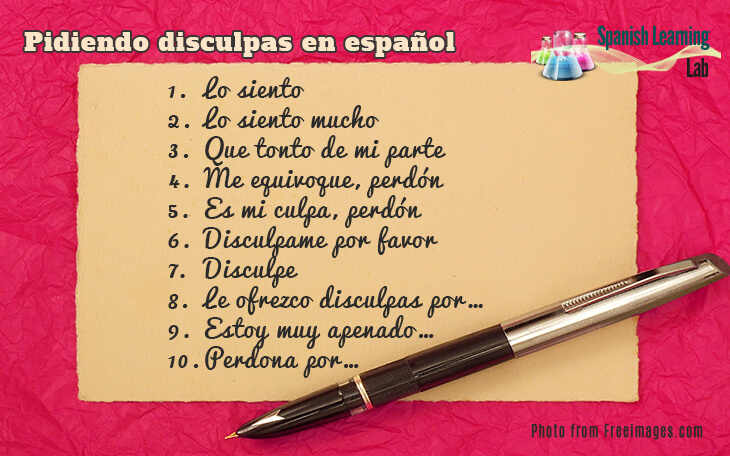Hola nuevamente. Today’s lesson will teach some basic ways to apologize in Spanish for being late and for several other situations. We will learn formal and informal ways to say sorry in Spanish through a nice picture and examples. More importantly, you will be able to practice with two listening activities. Comencemos…
Vocabulary introduction: Common ways to apologize in Spanish
There are many ways to apologize in Spanish. Basically, “Lo siento” would be the most common way to say “I am sorry” in Spanish, but we also have some more formal phrases as well. It is very common to use the verb “Disculpar” meaning “to excuse” or “to apologize”. This verb is a very polite way to apologize in Spanish and will be often used as “Disculpa” (tú), “Disculpe” (usted) and “Discúlpanos” (nosotros). These conjugations are based on the rules for the imperative tense in Spanish, a grammar topic that was briefly introduced in our lesson for classroom commands.
The verb “Perdonar” means “to forgive” and we often use it as “Perdón” (impersonal), “Perdona” (tú) and “Perdónanos” (nosotros). Notice that the verbs DISCULPAR and PERDONAR can be used as Spanish reflexive verbs, just like polite commands, e.g. “Discúlpame” or “Perdóname” (which is the title of several famous Spanish songs). In order to reply when someone offers apologies in Spanish with “Lo siento” or any of the phrases we have covered, the other person usually says “No te preocupes”, “No hay problema” or “No tienes que disculparte”. The picture below shows a short list of phrases you can use to say sorry in Spanish. We will be using these expressions later for listening practice.

Listening Activity No.1: Apologizing in Spanish – Disculpándose
Listening Activity No.2: Saying you are sorry in Spanish
Key phrases in the conversation:
- “Desde hace rato” means “for a long time”
- “La hora pico” means “The rush hour”
- “Estaba casi segura…” means “I was almost sure…”
